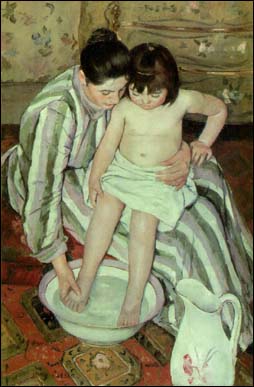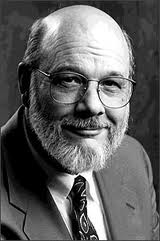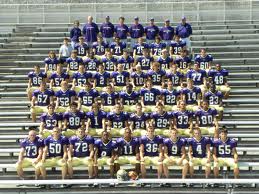Ex Church of Christ support groupHome * Website Purpose * History * UnBiblical Teachings * Spiritual Abuse Jesus' View of God * Faith & Works * New Covenant * The Pattern * Romans 14 |
|
|
_____________________________________________ James Fowler wrote Stages of Faith (1984), a book about his theory of the stages people go through in their lives as their faith changes.He suggested that atheists, agnostics and existentialists go through the same stages. Fowler sees each Stage of Faith as equally important. Stages cannot be rushed or skipped. People can regress during times of stress. People grow because each stage does not fulfill the person completely. They are not satisfied. Not all their questions are answered. They go through crises that demand their faith grow and change. Stage 1: Intuitive-Projective faith is a stage full of fantasy and imagination. The child imitates the faith of adults without understanding the symbols and meanings of the rituals. If sins are washed away, then perhaps one can see the sins floating on the water after a baptism. The child's faith is in the adults. The child imitates the adults' faith without understanding it. The child becomes very upset when the adult rituals they have learned are interrupted or changed. The danger of this stage is the fears inherent in a child's mind. A child may become terrified of hell and not be able to sleep, or an adult may use the fears of a child to manipulate the child into cooperation by descriptions of God's punishment. Stage 2: Mythic-Literal faith is a time when the child organizes the stories of the faith into an orderly fashion. Symbols and words are one-dimensional and literal. Baptism is being dunked in the water. Nothing more, nothing less. Stories become powerful for the child or adult in this stage of faith. The child may attempt to walk on water or imagine himself as Jesus performing miracles. If I am good to God, God will be good to me is a strong belief of the Stage 2 believer. Jacob's bargain with God after the dream of Jacob's ladder is a prime example of this kind of faith. Someone who believes there cannot possibly be a God because of all the suffering of innocent children in the world is a Stage 2 atheist. The child may believe that if they don't say their prayer every night they will be lost and go to hell if they die. They hurry to say the "in Jesus' name, Amen" before they die, so the prayer will be routed correctly. The woman who loses belief after not having an important prayer answered when she devoted herself all week to God, is firmly in Stage 2. Superstitious religions are part of Stage 2. Job's friends, who insisted he must have sinned if all of these terrible things were happening to him, were solidly in Stage 2. Stage 3: Synthetic-Conventional Faith is the authoritarian time of faith. The individual is not strong enough yet to hold their faith in themselves, so they entrust the faith to their group. Their group holds their faith. The group interprets truth, and loyalty to the group is of utmost importance. Groups are divided into groups like us and groups not like us. Only groups like us are good. All others are bad. Learning the rules and symbols of the faith are very important in this stage of faith. "What do we believe about baptism?" "What does brother Smith teach on the topic of premillenialism?" Most have a one-dimensional understanding of the rules. Advanced Stage 3 people want to know why the rules are the way they are. Leaders are very important to the person in this stage of faith. If a leader falls due to sin, or there is a church split, the person in Stage 3 may have a crisis of faith: the group that held their faith did not hold it safely. This person has difficulty understanding what is the most important thing to teach a new convert. A stage 3 missionary in Africa may spend an hour teaching a Swahili woman that the American Standard Version is the only reliable translation of the Bible. Most people in the United States stay in Stage 3 for the rest of their lives, whether they are religious or not. They identify with a group and never go beyond that identification. Fowler believes that most churches in the United States aim to grow their members up to Stage 3 and almost to Stage 4, and then stop. Any further and the church becomes uncomfortable with the member's faith. Stage 4: Individuative-Reflective Faith is the faith that no longer needs to depend on a group, but has strong personal beliefs that have been worked through in one's own mind. This person has strong black and white beliefs and may go on crusades to convert people. A woman in Stage 4 may be peaceful when separated for a time from her church by illness. She has a personal way of praying to God that chases away her loneliness. Others come to her to be taught how to be so peaceful. She can stand outside herself and see what her faith looks like to outsiders, and ask questions about her own faith. She is curious to grow and does not believe that she knows everything. A man in stage 4 knows what he believes and he knows why he believes it. He has reflected on his faith and has his own view unique to himself. Compared to Stage 3 he seems not to care what others think, except to argue and try to convert them. When they threaten to withdraw from him, he is sad, but he stands firm in his beliefs. Stage 4 people are often angry about what they view as the hypocrisy of Stage 3. People in stage 3 feel the stage 4 person is rebellious and angry and are irritated by his constant questions and off-the-wall comments in Bible class. Why can't he be respectful to the teachers who know what the group believes? Most people in Stage 4 drop out of churches and have a very difficult time finding a church to worship with. There is sometimes a stage between 3 and 4 characterized by the person who has left the family Thanksgiving Dinner, but is still standing in the driveway arguing with the people on the porch. Stage 5: Conjunctive Faith is faith that has gone beyond one's own group and has learned to see patterns in outsiders' faith that look similar to one's own group. Other groups have much to teach the person in Stage 5, and they love history, seeing themselves as part of a long chain. Racial and ethnic barriers do not exist to the person in Stage 5. In Stage 5 people are fascinated with outside groups and may seem wishy-washy to those in other Stages. Their powerful appreciation for multifacets may make everything seem relative to them and they may feel paralyzed when they need to make a stand. Stage 5 people are usually in mid-life and are often willing to make large investments in younger people to give them a sense of meaning in their lives. Another of the strengths of a person in Stage 5 is that they love symbols and ritual. Baptism is so rich and meaningful to the person in Stage 5 that they could not finish telling you all they love about baptism even if they taught it for an entire semester. They are grieved when people rush through the Lord's Supper because they relish partaking of the body and blood of the Lord and they cannot explain why they look forward to it so much. Yet they understand that they still only have a glimpse of the transcendent glory of God. Stage 5 believers are not interested in rules at all. They are only interested in principles. If a rule violates one of the principles they believe in, the rule gets tossed out without a moment's thought. "Sabbath was made for man, and not man for the Sabbath", Jesus taught when he found the Pharisees getting upset that he had done a miracle ("work") on the Sabbath day. The Sabbath day was to be kept holy by not working. It was one of the Ten Commandments and the Pharisees held the Sabbath commandment to be in the top four. Jesus healed someone on the Sabbath day, and did not feel he had violated anything in that commandment at all. Stage 6: Universalizing Faith is very rare. It is the faith that makes someone suddenly sell their house and move to Haiti to build a hospital because "they need a hospital in Haiti." If you marveled at them for their sacrifice they would not know what you are talking about. They were being joyful, not sacrificing. They have no thought for themselves. They love to serve others. People in Stage 6 create liberating spaces around themselves that attract and motivate others. Mother Theresa saw the poor dying in gutters on the streets of Calcutta. She asked permission from her order to open a hospice for them. She nursed them during their last days and gave them dignity. And she loved doing it. She taught her workers to look for Jesus in each one of their faces.
|
James Fowler, author of Stages of Faith
Morris Massey has a similar model to explain the values of different generations in our society.
|





